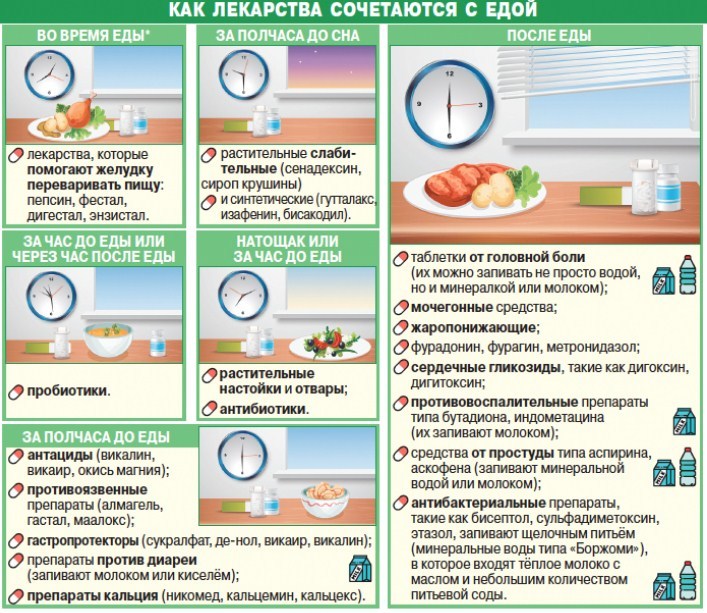After antibiotics first appeared on the market, they caused a real revolution in the world of medicine. After that, the number of deaths decreased significantly, people began to die less from different infections.
Content
- How much can you take antibiotics?
- How many days to take antibiotics?
- How to take antibiotics before or after eating?
- Can you take antibiotics and alcohol?
- Can you take antibiotics during pregnancy?
- How to take antibiotics to children?
- How to take antibiotics without harm?
- Video: correct intake of antibiotics
At the moment, there are many different antibiotics, many are sold even without a prescription. I would like to note that self -medication, even using such medications, leads to poor consequences. Bacteria begin to modify, adapt over time, therefore drugs cease to act on bacteria. In addition, if you drink antibacterial drugs without a doctor’s control, side effects may appear, as a result of which more serious consequences occur. Let's try to figure out how to take antibiotics together so that they do not harm the body.
How much can you take antibiotics?
- You can take an antibiotic One species a month after the previous trick, if the medicine was able to give an excellent effect during treatment. If the antibacterial drug did not help, it is not worth drinking again.
- But you can not abuse this rule and drink one drug to treat all infections without exception. The drug can become useless for the disease, or bacteria will form a mechanism of resistance to this group.
- In order to eliminate the infection, you can not be treated for a long time with only one group of antibacterial agents. As a rule, hospital strains reach the maximum level of resistance, if often contact with antibacterial components. And each subsequent time to choose a destructive drug for them is more difficult and more difficult.
- We note that the reception of funds that have expired the expiration date can cause serious intoxication in the body. What is the danger of expired antibacterial drugs? On packages, manufacturers indicate the shelf life of the drug for a maximum of 5 years. Thus, they note the guarantee of the therapeutic effect of the medicine, as well as its safety for the human body. During this period of time, the chemical compound remains unchanged. But there is no complete guarantee that the expired drug will have at least some effect on the body. A person can be poisoned very much, a death can also occur.
- It is necessary to carefully approach the treatment with antibiotics, comply with the doctor's instructions, Do not interrupt the desired period of therapy. Only in this case, drug treatment will lead to a complete recovery.

How many days to take antibiotics?
- The action of antibacterial drugs is aimed at the following - they suppress the development of bacteria. If unauthorized treatment at the first signs of colds, complications may occur over time.
- By purpose of the doctor, you can take antibiotics from 7 days to 10 days. If the medicine is potent, it is allowed to take no more than 5 days. There are even special schemes, for example, taking the medicine for 3 days, and then 3 days a break.
- If the patient has an improvement, therapy still does not stop. When the patient is completely recovering, he must continue to take antibiotics during 3 days. If after this time the patient's condition remains unchanged, then the doctor may prescribe another medicine.
- The dosage of antibacterial agents can be at least 1 time per day and a maximum of 4 times a day. Repeated treatment is possible after 1 or 2 months.

How to take antibiotics before or after eating?
Antibiotics can be different:
- Chemical composition.
- The principle of destructive effect on bacteria.
That is, one identical mechanism of effects from these drugs does not exist (even those that belong to one group). This must be taken into account while taking antibiotics.
There are two methods of taking antibiotics:
- Only on an empty stomach.
- Regardless of eating - before it, simultaneously with food, shortly after a snack.
When taking antibiotics before meals the presence of food in the stomach greatly lowers the effectiveness of the medicine. Food prevents the absorption of the drug, because of it it can be destroyed hydrochloric acid. Therefore, it is necessary take an antibiotic A couple of hours after eating. In the second case, the digestive process, on the contrary, helps to quickly absorb the active substances, protects the gastrointestinal mucosa from irritation.
It’s simply impossible to remember all the rules for using antibiotics without working as a pharmacist. Therefore, when the doctor prescribes such drugs, it is necessary to carefully study the instructions for use. It describes in detail all the instructions and methods of admission.

Consider groups of antibiotics and how they must be taken:
- Penicillins. Such drugs are taken on an empty stomach.
- Cephalosporins. On an empty stomach (zyfixim, ceftibuten) or directly with food (cephadroxine) can be taken.
- Macrolides. Some are prescribed to be taken simultaneously with food (spiramycin) or on an empty stomach (azithromycin).
- Fluoroquinolones. It is allowed to take such medicines after food, on an empty stomach, while eating.
Can you take antibiotics and alcohol?
We will single out the most important reasons because of which you can not drink alcohol by taking antibiotics:
- The minimum effect. Squirrels modified from alcohol do not interact with antibiotics components. This can minimize or completely exclude the effect of treatment.
- Liver damage. We all know that the liver is a kind of filter of the whole organism. When alcohol and drugs come through the liver at the same time, they greatly increase the negative load on the organ.
- Fast removal of the drug. Ethyl alcohol and other substances contained in alcohol can accelerate the absorption of antibacterial agents in the digestive tract. Because of this, the medicine is removed from the body faster.
- Changing the composition of the medicine. When the antibiotic mixes with alcohol, the substances of the drug begin to change a lot. The consequences of this technique are sometimes very serious. The patient may be disturbed: dizziness, vomiting, convulsions.

Can you take antibiotics during pregnancy?
- At the initial stage of pregnancy (first 3 months), many drugs can harm the unborn child. Therefore, during this period of time it is desirable do not take antibiotics.
- The following trimester are considered safer, but for any drug there are their own deadlines when they are forbidden to drink. These nuances are well known to all doctors.
- Since some bacteria are resistant to antibacterial agents, before starting therapy it is desirable to do sensitivity test. The test will show which bacteria caused the disease, which medicine acts on the disease better.
- If you can not make a test, the doctor may prescribe a pregnant woman to drink antibiotics of a wide range of exposure, which kill all small foreign organisms in the human body.

All antibacterial drugs for pregnant women are divided into such categories:
- Fully prohibited. They have a toxic effect on the unborn child.
- Allowed. Do not affect the fetus negatively.
- Not fully studied. Scientists have not yet been able to completely find out how exactly such antibiotics affect the fetus. Therefore, they are appointed only in extreme cases.
How to take antibiotics to children?
- Usually, The average course of therapy with antibacterial agents is at least 3 days and a maximum of 2 weeks. Sometimes doctors extend the medication, but do this in extreme cases when treatment does not give a positive result without these drugs.
- The point is not that the manufacturers did not decide in the formal approach of doctors. Just every malicious microbe with which the antibiotic fights, eventually gets used to the action of the drug. Some bacteria die in the first few days after the start of therapy, but there are those that are more resilient.
- With such bacteria, over time, can be dealt with the immune system. However, our body has the ability to remember. And when the next time the bacteria enter the body, they quickly adapt to the antibiotic with which they are already familiar. For this reason, doctors advise to record what medicines you treated your own child. So that the next time the doctor decides to write out the antibiotic, you told him what antibiotics were taken by the child.
- Based on this information, the doctor will select the medicine correctly, Effective celebration with the causative agent of the disease. Doctors do not prescribe the same tool with small gaps between the ailments.
- Do not forget, if your child has become easier, this does not mean that they are destroyed All harmful bacteria. The remaining will “wait” when the attack on them with a medicine ends. After that, they will be able to calmly form their protection against the means, make the ailment chronic.

How to take antibiotics without harm?
Antibiotics quickly destroy bacteria. But they begin to weaken if the patient takes them incorrectly.
There are basic rules for taking antibacterial drugs. They must be strictly observed:
- If you are a doctor prescribe antibiotics, completely record the course of treatment. Do not forget to record the name of the disease, the medication that was taken, the course of therapy, possible side effects, allergies. Thanks to these data, the doctor will understand what medicines to prescribe to you. Also tell the doctor what drugs you are already drinking.
- You can not ask a doctor that he he prescribed an antibiotic. Yes, these drugs can kill bacteria faster, improve the patient's condition, but this is not in every case correctly. Do not drink potent medicines. They are not always more effective. If a pharmacy is offered some kind of analogue, consult your own attending physician. Specify what is part of a particular drug, so as not to violate the dosage that the doctor prescribed.
- Give it off if possible analysis for bacterials. So the doctor will find out how antibiotics act on the body, pick up the perfect medicine. The disadvantage of such an analysis is that the result will be ready after about 7 days.
- Take the medicine through the same time intervals to maintain the necessary level of medicine in the body. if you prescribed antibiotics 3 times, Then take the medicine every 8 hours.
- The course of treatment with an antibiotic, as a rule, is 7 days. Sometimes doctors extend the therapy. Significant drugs can be taken once a day for no more than 5 days.
- You can not interrupt the course of treatment. It is also necessary to monitor what effect this or that medicine gives.
- Never on your own Do not adjust the dosage of the drug. If you make a dose less, bacteria will be resistant to antibiotics. If, on the contrary, you increase the dose, side effects may occur.
- Take the antibiotic strictly according to the instructions. For example, drink the medicine only with water. You can not drink milk, tea and other similar drinks.

- When you will be treated, adhere to a special diet. Do not eat smoked foods, fatty or fried food, conservation. It is also not recommended to drink alcohol. The effects of alcohol on the intake of antibiotics were written above.
- During treatment, take probiotics simultaneously with antibiotics - drugs that restore the intestinal flora. It can be special fermented milk products. Take them between each intake of the antibacterial agent.
In the following articles you can find out about taking such drugs:
- Physiothens tablets
- Chlorhexidine
- Filtrum Steam
- Bisoprolol drug
- Vitamin A in capsules







